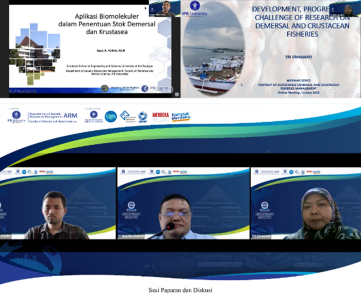IPB University’s MSP Department Holds Webinar on Sustainable Management of Demersal and Crab Fisheries

Department of Aquatic Resources Management (MSP), Faculty of Fisheries and Marine Sciences (FPIK) IPB University held a webinar series with the theme 'Portraits of Sustainable Demersal and Crustacean Fishery Management', (15/6). This event was held thanks to the support of the Indonesian Crab Management Association (APRI) and the Indonesian Demersal Association (ADI).
This webinar is one of a series of events leading up to the peak of the International Seminar on Demersal and Crustacean Fisheries Management (ISDCFM 2023) which will be held on 2-3 August. This activity was attended by 140 participants from various government institutions, universities and non-governmental organizations (NGOs).
"This activity is expected to enrich the public's knowledge about the potential and problems that exist in the management of demersal and crustacean fisheries in Indonesia," said Prof Hefni Effendi as Head of the IPB University MSP Department in his remarks.
In addition, efforts to manage demersal and sustainable crustacean fisheries are in line with point 14 of sustainable development goals (SDGs) (life under water), namely to utilize and sustain marine and oceanic resources for future development.
On the same occasion, the Dean of FPIK IPB University, Prof Fredinan Yulianda said that the potential for fisheries in Indonesia is very large and needs to be mapped, so that these opportunities can be put into use for the welfare of the community.
Dr Mohammad Mukhlis Kamal as Chair of ISDCFM 2023 and moderator of this webinar said, management of fishery resources in Indonesia is currently faced with new challenges and paradigms that are not limited to single species and ecology, but the Ecosystem Approach to Fisheries Management (EAFM).
"Therefore, in this activity more emphasis is placed on the results of research on demersal and crustacean fisheries, databases and processing of fisheries data, especially after the restructuring of research implementation in Indonesia which was previously carried out by each ministry/institution to be merged into BRIN," he said.
Researcher from the National Research and Innovation Agency (BRIN), Tri Ernawati, SPi, MSi, in her presentation explained that the provision of data and information on fishery resource stocks throughout the Republic of Indonesia's Fisheries Management Area (WPPNRI) is one of the priorities in the National Medium Term Development Plan (RPJMN) from 2020 to 2024.
"However, the data collection has stopped since 2022 or since all research in government/institutions was merged into BRIN. This is quite troubling considering that the provision of stock data and information needs to be carried out continuously and is consistent," he explained.
Agus Alim Hakim, SPi, MSi who is a PhD student at the University of Ryukyus reviewed biomolecular applications in managing demersal and crustacean stocks in Indonesia. Agus explained that molecular species assistance is an important thing to do before carrying out a fish stock assessment. Because the main prerequisite in conducting information on fishery stocks is the ability to reveal different species.
"Molecular species identification can answer the phenomenon of cryptic species and complex species, namely the existence of two or more different species, but classified under the same species name or vice versa. "Hopefully biomolecular research will continue to develop considering that demersals and crustaceans are groups of animals that are able to move across Fisheries Management Area (WPP), thus allowing crossbreeding between demersals or crustaceans in one WPP and another WPP," he explained.
Another guest speaker, Dr Irfan Yulianto from the Fisheries Resource Center of Indonesia (FRCI), the Rekam Nusantara Foundation, presented the results of research on snapper and grouper data collection in Indonesia with an emphasis on the importance of good fisheries data collection. Good data can produce good recommendations, and vice versa.
“We have developed a citizen-science based fisheries data acquisition initiative called FISH or Fisheries Data Collaboration Initiative. The fisheries data can be accessed by the public, and opens opportunities for collaboration with the government and academics to conduct research and scientific publications," he explained.
Professor of FPIK IPB University, Prof Sulistiono explained the results of mud crab research in various regions in Indonesia, where the spawning season and mature size (mature gonads) of mud crabs varied. He also examined the rules for fishing for mud crabs in the Minister of Maritime Affairs and Fisheries Regulation No 16 of 2022.
"The carapace size of 12 cm is applied to all mangrove crab species, even though the adult size of each species are different. This ecobiological research and data is very important as a basic reference in making fisheries policies," he said. (*/Rz) (IAAS/BKU)



